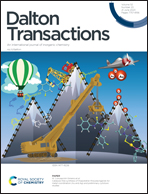Cellular membrane-targeting ruthenium complexes as efficient photosensitizers for broad-spectrum antibacterial activity†
Abstract
A ruthenium complex [Ru(phen)2(phen-5-amine)-C14] (Ru-C14) with broad-spectrum antibacterial activity was designed and synthesized; positively charged Ru-C14 could target bacteria via electrostatic interactions and showed high binding effectiveness to cell membranes. In addition, Ru-C14 could act as a photosensitizer. Under 465 nm light irradiation, Ru-C14 could generate 1O2, thus disrupting the bacterial intracellular redox balance and leading to bacterial death. Ru-C14 also exhibited minimum inhibitory concentration values of 6.25 μM against Escherichia coli and 3.125 μM against Staphylococcus aureus; these values are lower than those of streptomycin and methicillin. This work combined the merits of cell membrane targeting and photodynamic therapy for antibacterial activity. The findings might open up a new avenue for effective anti-infection treatment and other medical applications.



 Please wait while we load your content...
Please wait while we load your content...